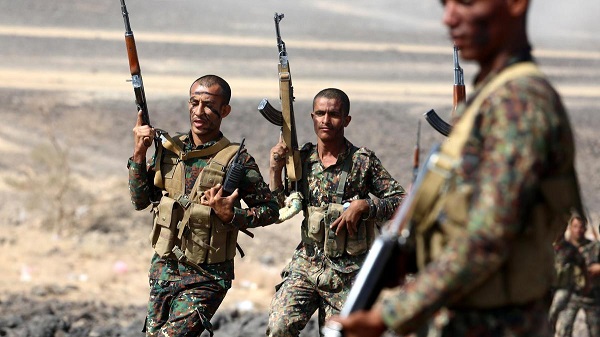Alwaght- After the unprecedented condemnation of the parties participating in the anti-Yemeni war and blasting the UAE in particular last month, Turkey, reports say, is recruiting foreign and Syrian mercenaries who are fighting in Syria for deployment to Yemen to support the Muslim Brotherhood-aligned Al-Islah Party.
The Syrian Observatory for Human Rights, a group monitoring the Syrian war since the beginning of the conflict in the Arab country in 2011, said that it had information that the Turkish forces operating in the Syrian city of Afrin are recruiting and transferring armed groups from Afrin to Qatar with thousands of dollars in pays to them for deployment to the war-devastated Yemen, against which Saudi Arabia and its ally the UAE in March 2015 waged a devastating war to reinstate the fugitive President Abdrabbuh Mansour Hadi.
If the information is true, it represents an important development, meaning that despite its past reluctance Ankara is stepping into the Yemen war case. But what goals are taking Turkey to Yemen war? What influences can this intervention leave on the course of the war in Yemen and the regional developments?
Turkish National Security Service and mercenary recruitment strategy
Over the past few years and as the developments in the region moved fast, the Turkish government intensified gradually the role of the country’s National Security Agency, led by Hakan Fidan, in the important regional cases and especially the Syrian war. President Recep Tayyip Erdogan’s contentment with the agency in handling foreign cases motivated the government to give it a bigger role in the nation’s foreign policy.
The agency apparently handles the Libyan case and plays the top role in the Turkish policy in the case. This is apparent from Fidan’s participation in a majority of the visits of the Turkish delegations to the Libyan capital Tripoli, where the allied Government of National Accord (GNA) is ruling led by Prime Minister Fayez al-Sarraj, and when Libya-related meetings are held by the government. Earlier, Erdogan hailed the NSA “positive” role in Libya.
The important point is that when the NSA was tasked with handling the Libyan case, it designed and implemented a plan according to which armed groups fighting in Syria were deployed to Libyan fronts to back the Ankara-supported GNA. In addition to cutting the Turkish potential casualties and costs the deployment provided a considerable backing to the GNA-loyal forces as the new fighters had their combat skills honed in the Syrian battlegrounds. Thanks to their assistance, the GNA forces made remarkable gains and shifted from defensive to offensive positions against the militia of General Khalifa Haftar, a rebel leader who since last year launched a campaign to seize the capital Tripoli from the internationally-recognized GNA.
The program, so far made acceptable gains to the Turkish government in the foreign policy, motivating the NSA to apply it also to Yemen. The report by the Syrian Observatory in mid-June should be considered a proof of this claim. The report suggested that the Turkish intelligence agents based in Afrin have set up an operation room to transfer militants from Syria to Yemen battlefronts to assist Yemen’s Al-Islah party that is holding and implementing the Muslim Brotherhood agenda. Muslim Brotherhood is a political group with Islamist ideology across the Arab world with its leaders mainly pursuing subversive agenda against established monarchies. Egypt, Saudi Arabia, and the UAE ban it as a terrorist organization.
So, the use of Syrian and foreign mercenaries has become a major strategy for the Turkish NSA, something helping it pursue its agenda and goals in sensitive regional cases.
What goals are driving Turkish Libya intervention?
In general, Turkey seems to be following a couple of goals through its intervention in the Yemen war. Here are they:
1. Backed by its loyalist forces, Turkey plans to promote its influence and presence in Bab-el-Mandeb Strait. This can be facilitated as the country operates a military base in Somalia, a country with relatively long coasts along the Indian Ocean.
2. As the Syrian case nears an end amid Ankara agreements with Moscow and Tehran, Turkey plans to use a part of the loyalist militant fighters who are expiring in the Syrian war to involve in other regional cases to serve its goals.
3. Turkey intends to, by strengthening the Muslim Brotherhood branch in Yemen, open a new front against the Saudi-Emirati camp. Yemen due to its closeness to the two countries can present an appropriate launching pad to deal blows to Riyadh and Abu Dhabi that are rivaling Ankara in some regional cases, including Libya where the two allies have provided weapons and logistics to Haftar’s unsuccessful assault on Tripoli. Securing a toehold in Yemen can boost Turkey’s bargaining power in other regional cases where it faces off the Saudis and Emiratis.
4. In this sensitive and decisive juncture of Yemen developments, especially what is going on in the south, Turkey does not want to fall behind the major regional rivals playing a role in this strategic part of the region. This means that Turkey does not only consider the Saudi and Emirati role in the Yemeni case. It is also watching the Iranian role in the case.
The impacts of the Turkish involvement in the Yemeni case are by themselves substantial, as Turkish engagement will bring to a serious confrontation the Turkish-Qatari Muslim Brotherhood camp with the Saudi-Egyptian-Emirati camp. Such a new front with Turkey will provoke further the Arab trio’s sensitivity to the Turkish activism that they believe will undermine the Arab security.
Actually, in addition to compounding other cases like Libya’s, deeper involvement in Yemen case by Turkey along with Qatar will leave a weighty influence on Doha relations with the Saudi-led blockading countries.



























